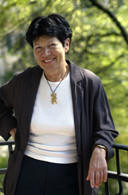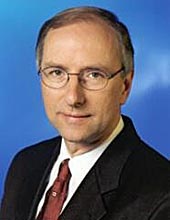|
News & Views item - November 2004 |
![]() On 26
November 2004 the European Council of Ministers, Representing the 25 Member
States of the European Union, Will Discuss Whether and How the EU Will Support
Basic Research. (November 9, 2004).
On 26
November 2004 the European Council of Ministers, Representing the 25 Member
States of the European Union, Will Discuss Whether and How the EU Will Support
Basic Research. (November 9, 2004).

 For the second time in three months the journal Science
has asked the chair of the European Research Advisory Board and director of the
Society in Science program at ETH Zürich, Helga Nowotny, to contribute its
editorial -- this time with Wilhelm Krull, secretary general of the
Volkswagenstiftung.
For the second time in three months the journal Science
has asked the chair of the European Research Advisory Board and director of the
Society in Science program at ETH Zürich, Helga Nowotny, to contribute its
editorial -- this time with Wilhelm Krull, secretary general of the
Volkswagenstiftung.
Their topic -- A Decisive Day for European Research
Meanwhile Australia's Minister for Education, Science and Training has signalled that as far as Australian universities are concerned, no more Mr. Niceguy, and is in the process of telling the vice-chancellors how the world according to Prime Minister John Howard will now work as regards plans to extend the use of Australian Workplace Agreements, reduce industrial action in universities and ban compulsory student unionism. He will also explain how the taking of legislative control of universities from the states by the Commonwealth would be in their interests. Based on media reports -- if they don't like it, tough; he's gonna have the numbers in the Senate. As to matters of appropriate support for learning and research at universities -- well, first things first, we may get to that eventually, but there's this matter of what's the best way to teach kids to read. That's good for another YAR (yet another review). Apparently it's not possible to use whole word recognition and syllabification concurrently, might addle young minds.*
Getting back to Nowotny and Krull their interest is focused on November 26 because ministers from the European Union's (EU) 25 member nations will discuss whether and how the EU will support basic research in the years to come. The matter of forming a European Research Council (ERC) is more than likely to be discussed, and the EU's researchers are anxious that the European Council of Ministers endorse the ERC before the year's out.
While there is an air of optimism with regard to the endorsement, Nowotny and Krull point out, "The ERC is meant to be independent from institutions of the EU and national governments. To have a noticeable impact, its budget must be on the order of at least 1 to 2 billion euros annually. This sum means that almost one-fifth of the future EU research budget will no longer be under the direct control of the Commission and its dealings with national governments." Furthermore, it is clear that at least in some cases the stipulation that ERC grants would be based solely on merit is disturbing because some members may miss out. But the two editorialists are adamant, "Any legal form for the ERC must ensure that no criteria other than scientific quality, based on peer-reviewed competition, have an impact on its decision-making. This includes the total exclusion of any juste retour considerations, which are not only purely unscientific but also inhibit fair competition and international competitiveness in basic research. Such guarantees for the decision-making process are an essential prerequisite for the ERC's long-term success.
Should the ECM decide to postpone its decision until 2005 or even to ignore the needs and demands of European researchers and research organizations, the consequences would be enormous. The European Research Area would not enter its next and crucial phase, in which the very best of basic research will provide the foundation for the innovations of tomorrow. A further loss of some of the best researchers could be inevitable. Europe cannot afford such negative consequences."
Whether or not the European Council of Ministers takes heed of Nowotny and Krull's warning will be apparent in little over a fortnight. If the ECM do act decisively, Australia and not only Australian science ought to worry. The policies currently being followed by our government will further distance us from the progress of North America, Europe and in the not very distant future, the leading Asian nations.
*Note (10/11/04): Kelly Burke, Education Reporter for the Sydney Morning Herald observed in today's edition, "[T]eachers and academics have become alarmed this week at what appears to be a return to the old a) phonics or b) whole of language answers to the complex question of literacy, when most experts decided a decade ago that the correct answer was, in fact, c) both - and much, much more.
"'Frankly we've moved right past that stage,' said NSW's deputy director-general of education, Alan Laughlin, yesterday, responding to an announcement by the federal Minister for Education, Brendan Nelson, of a national review of the way children are taught to read.
"'The evidence we have now shows that there is not one method that is superior to the other. It depends on the child ... and we expect teachers to use all these skills to match each child's needs.'"
For a child given his first hammer everything in sight becomes a nail; this appears to be true for Dr Nelson having been given the power to institute reviews.